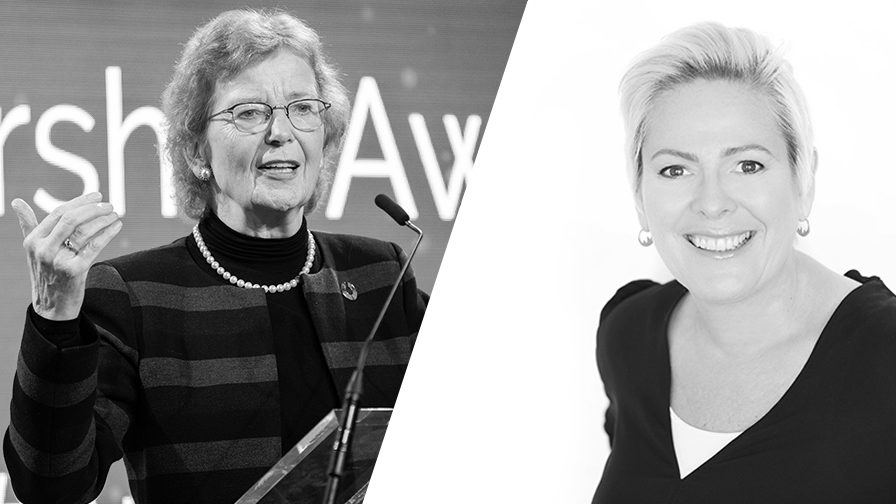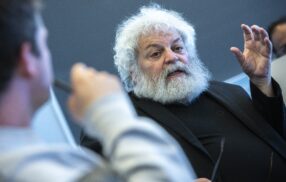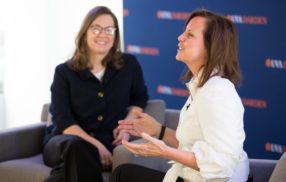
Leadership Unscripted: Female Global Leaders Consider Opportunities for Change in a Time of Crisis
By Dave Hendrick
The multiple crises roiling the globe, including the ongoing coronavirus pandemic, civil unrest to protest racial injustice and a climate crisis that continues unabated, could overwhelm the most seasoned global leader. And yet, the current era of global tumult has also provided an opening for meaningful change.
Speaking at a Leadership Unscripted event sponsored by the University of Virginia Darden School of Business, former President of Ireland Mary Robinson relayed being “quite depressed” in January, following the report from the Intergovernmental Panel on Climate Change noting the seemingly impossibly steep climb to hold warming below 1.5 degrees Celsius. That was followed by the coronavirus pandemic, which continues to devastate the world unequally, “exacerbating inequalities,” the former president said.
But despite a world that may appear to be spinning out of control, the former president said she is “less down and depressed” than she was at the year’s outset, heartened by the potential “opening” to build a better world.
The pandemic has laid bare our “vulnerability as a human race,” Robinson said, and demonstrated that it is “collective behavior that is the only thing between us and a much worse illness and death.” Simultaneously, the pandemic has led to a greater sense that “science matters” and increased levels of compassion and empathy. While there is still a “real hill to climb,” Robinson suggested there was now a new opening for people, organizations and business to tackle systemic issues.
Robinson — who served as president of Ireland from 1990–97 and now serves as chair of The Elders, a group of global leaders with a mandate to work toward peace, justice and human rights — was joined by Halla Tómasdóttir, a former presidential candidate in Iceland and CEO of The B Team, a group promoting the role the private sector can play in furthering sustainability, equality and accountability.
Tómasdóttir agreed that it seemed like the potential start of an new era, noting the pandemic and the global protests for racial justice, saying many were refusing to go back to “business as usual.”
“I have never seen a bigger opening to actually have meaningful conversations about the changes we need to make happen in our society,” said Tómasdóttir.
Tómasdóttir said she believed trust with the private sector broke following the global financial crisis of 2008–09, particularly as business went back to business as usual. The current crises and unrest have made clear the world needs a “new vision of leadership,” Tómasdóttir said, one where business leaders see their roles as a “service to humanity” as opposed to simply service to shareholders.
“The way we have been leading has left us with a world in a mess,” said Tómasdóttir.
Asked whether female leaders brought a unique skill set to leadership positions — many news reports have noted that countries led by women appear to be handling the coronavirus pandemic comparatively well — Robinson said women often lead with a humility that can be absent in their counterparts, making them more likely to listen and collaborate.
When she speaks with other women who have held top political offices, they often discuss missteps or areas for improvement, Robinson said, adding that the ability to “self-critique” was a strength.
“Humility is an essential skill,” said Robinson. “You may be a leader, but you are on the shoulders of so many. Remembering that is very important.”
Tómasdóttir said women often suffer from a perceived lack of confidence. Rather than trying to build up reserves of confidence, which Tómasdóttir said can too often lead to hubris, the B Team CEO suggested focusing on courage.
“I would never have done anything in my life if I had waited until I was confident,” said Tómasdóttir. “When you embrace courage — courage sits in the heart — I think you open up to being a human that understands that we are all interdependent.”
Tómasdóttir said she hopes leaders take the opportunity to tackle “our crisis of conformity” and start “reimagining what kind of world we want.”
“There’s not a single person I have met who really knows how to solve climate change, or COVID-19, or the protests and how people are feeling, or our broken economic system. Humility is about the fact that it’s about all of us. It’s up to us.”
Former President of Ireland Mary Robinson Discusses Unique Traits of Female Leadership
Halla Tómasdóttir Explains the Difference Between Confidence and Courage
Listen to the Full Leadership Unscripted
The University of Virginia Darden School of Business prepares responsible global leaders through unparalleled transformational learning experiences. Darden’s graduate degree programs (MBA, MSBA and Ph.D.) and Executive Education & Lifelong Learning programs offered by the Darden School Foundation set the stage for a lifetime of career advancement and impact. Darden’s top-ranked faculty, renowned for teaching excellence, inspires and shapes modern business leadership worldwide through research, thought leadership and business publishing. Darden has Grounds in Charlottesville, Virginia, and the Washington, D.C., area and a global community that includes 18,000 alumni in 90 countries. Darden was established in 1955 at the University of Virginia, a top public university founded by Thomas Jefferson in 1819 in Charlottesville, Virginia.
Press Contact
Molly Mitchell
Associate Director of Content Marketing and Social Media
Darden School of Business
University of Virginia
MitchellM@darden.virginia.edu







